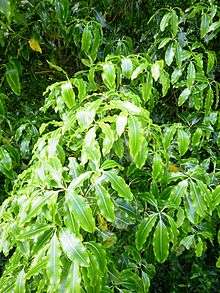Pittosporum eugenioides
| Tarata | |
|---|---|
 | |
| Scientific classification | |
| Kingdom: | Plantae |
| (unranked): | Angiosperms |
| (unranked): | Eudicots |
| (unranked): | Asterids |
| Order: | Apiales |
| Family: | Pittosporaceae |
| Genus: | Pittosporum |
| Species: | P. eugenioides |
| Binomial name | |
| Pittosporum eugenioides A.Cunn., 1840 | |
Pittosporum eugenioides, common names lemonwood or tarata, is a species of New Zealand native tree. Growing to 12 m (39 ft) tall by 5 m (16 ft) broad, it is conical when young but more rounded in shape when mature.[1] Its leaves are mottled yellow-green with curly edges and a salient bright midrib, and have a strong lemony smell when crushed.[2] It has highly fragrant clusters of attractive yellow-cream flowers in spring, followed by distinctive black seed capsules.[2] It is found throughout New Zealand's North and South Islands along forest margins and stream banks from sea level to 600 m (1,969 ft).[2] It is New Zealand's largest pittosporum.[3]
The binomial qualifier eugenioides means "resembling Eugenia", a different genus of plants.[4]
The variegated cultivar 'Variegatum' has gained the Royal Horticultural Society's Award of Garden Merit.[5]
Traditional uses
Maori traditionally used the gum and crushed leaves and flowers of the tarata for scent,[6] usually mixed with plant oils such as titoki and kohia.[2]
References
| Wikimedia Commons has media related to Pittosporum eugenioides. |
- ↑ RHS A-Z encyclopedia of garden plants. United Kingdom: Dorling Kindersley. 2008. p. 1136. ISBN 1405332964.
- 1 2 3 4 "Joanna Orwin. 'Shrubs and small trees of the forest - Pittosporums', Te Ara - the Encyclopedia of New Zealand". Retrieved 26 March 2014.
- ↑ "Pittosporum eugeniodes (Lemonwood)". T.E.R:R.A.I.N - Taranaki Educational Resource: Research, Analysis and Information Network. Retrieved 26 January 2017.
- ↑ Harrison, Lorraine (2012). RHS Latin for gardeners. United Kingdom: Mitchell Beazley. p. 224. ISBN 9781845337315.
- ↑ "RHS Plant Selector - Pittosporum eugenioides 'Variegatum'". Retrieved 17 July 2013.
- ↑ "Transactions and Proceedings of the Royal Society of New Zealand 1868-1961". National Library of New Zealand. 1908. p. 234.